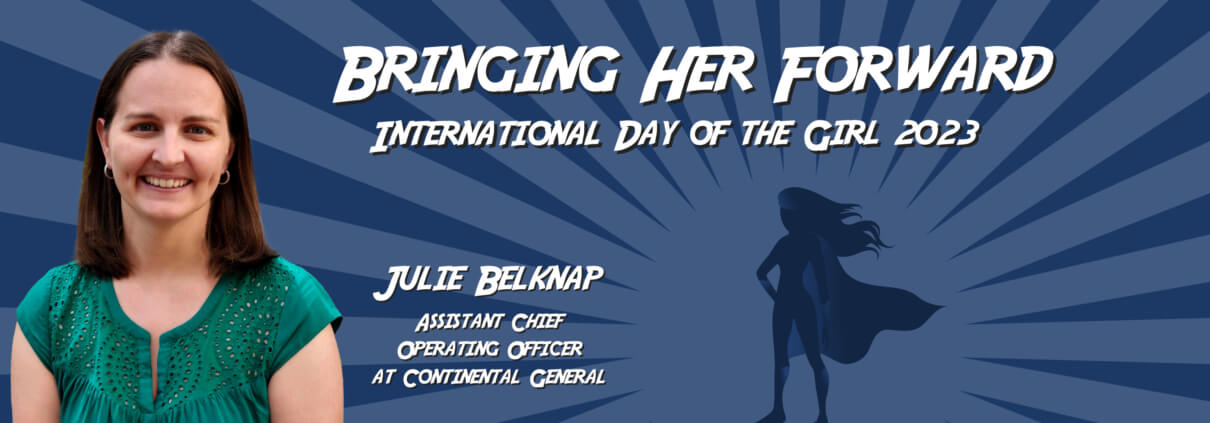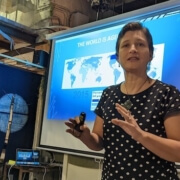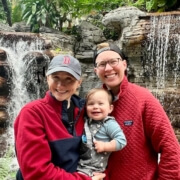Building Diversity in LTCI: Meet Julie Belknap
Julie Belknap, Assistant COO at Continental General, is passionate both about her innovative work in LTCI and how she can open doors for future female leaders in the field. There is much to learn in this brief interview, and we are grateful to Julie for taking the time out of her busy schedule to share her thoughts.
How long have you been in the LTC space and what attracted you to pursuing this career path?
I have worked in the long-term care industry for almost 17 years in many different roles. My pursuit of a career in actuarial led me to the insurance industry initially, and it just happened to be with a company that had long-term care. In 2013, I became an Associate in the Society of Actuaries, but in 2016, I took my learnings from actuarial and started applying them in non-traditional ways. I’ve had the opportunity to develop and lead initiatives related to rate increase implementation, internal controls, enterprise risk management, claims, and wellness.
A deep appreciation and respect for this industry has kept me here. I love that it’s a smaller, interconnected industry. If you don’t know someone, there’s a good chance you know someone who knows that person.
It’s rewarding to hear firsthand from our insureds and their families about the impact this product has on their lives. I feel the industry is stepping up to the challenge and finding innovative products and programs to help people age more successfully. I want to be a part of that solution.
Did you have any female role models? How did they support your career growth?
When I transitioned into my role leading the claims department, the team I was leading grew from about 10 to 50 people in an instant. I was nervous, to say the least, but my sister, an inspiring leader in her industry, provided encouragement and sent me books that shaped some of her leadership views. That was my first introduction to Brenè Brown. Her research on courage, vulnerability, shame, and empathy has influenced my leadership style.
The phrase “Strong back and soft front” has been around for some time, and there are many variations to it, but Brenè Brown adds the “wild heart” concept to it. She explains that this is holding the tension between two opposing feelings – fierce and kind, tough and tender, grit and grace. Often, leadership is a combination of conflicting emotions. It means showing vulnerability even when you are being tough. It means challenging the status quo. This mantra expands beyond leadership and into life.
I’m a big believer that there is something to learn from everyone you meet, and I’ve had the opportunity to meet and work with some amazing women during my career growth. These women have accomplished so much in their careers and are willing to provide guidance on a professional and personal basis. I am grateful for the opportunity to continue to learn and grow through these connections and be one of those females for the next generation.
Have you been a mentor? How have you helped an aspiring female professional pursue a career in long-term care insurance?
Mentoring professionals is very important to me. The insurance industry isn’t typically on someone’s dream job list. However, it’s something that many people find rewarding once they get here, especially if they have had a personal experience with someone they care about needing or receiving long-term care services. Passing on the knowledge of where the industry has been to get to where we are today is important to help us continue evolving.
I’ve had the opportunity to mentor several aspiring female professionals pursuing long-term care careers. It’s essential to identify their growth and leadership potential, no matter what their current role is within the company, and to give them opportunities to try new things. Providing opportunities to grow and sometimes even fail in a safe environment is invaluable.
It’s also been important to me to pay it forward and introduce mentees to other females within the industry to help build up their personal network. Even if they decide to move on to a new company in the future, having that professional stay within the long-term care industry is a win.
Can you share any memorable experiences or instances where your influence has brought about positive change in the industry?
The long-term care insurance industry has faced its share of challenges and has persevered through innovation and new perspectives. Since some of these policies were originally contemplated, there have been evolutions in the care settings from home health care agencies, assisted living facilities, dedicated memory care facilities, continued care retirement communities, and now, to the idea of robotics and technology in the home.
There have been new features like cash benefits or an alternate plan of care to allow for more flexibility and new insurance offerings like hybrid products to fit the aging population’s needs. The long-term care industry is also trying to learn from other industries how to better support the aging population through wellness initiatives. There is no one solution to ensuring that long-term care insurance stays relevant as care needs evolve. It takes new perspectives coming in and a willingness to learn from others.
With my actuarial background, I have provided a unique perspective by leading non-traditional actuarial areas like claims. My analytical approach introduced new ways of looking at processes and data. I improved communication across departments and helped remove biases in how people thought the processes worked. I’ve shared these insights by presenting at industry meetings and having discussions with other leaders in the long-term care industry. Our industry has some truly inspiring leaders, and I am excited to see its continued growth and evolution.
What do you believe is the key to empowering more women to pursue leadership roles and become influencers in the long-term care insurance sector?
Empowering women to pursue leadership roles is key to our industry; it takes dedication and support to get there. Leaders within their companies need to identify these individuals with leadership potential early on and create opportunities for them to enhance those skills further. That might be through training, mentorships, projects, meetings, conferences, etc. It also means that companies have a responsibility to create internal opportunities to encourage these individuals to stay and grow within the organization.
Similarly, having more industry-wide opportunities — conferences, industry meetings, panels, or networking events — for women to connect with each other would be highly beneficial. It cultivates an inclusive environment and empowers them to feel more confident about sharing their knowledge and experiences.
How do you envision the future of female representation in the industry, and what steps do you believe should be taken to further promote gender equality and inclusivity?
I’ve been encouraged by the growth of female representation in leadership roles within the industry since I started. There has been a greater emphasis on the need for companies to ask tough questions and have uncomfortable conversations to determine how they are doing regarding diversity, equity, and inclusion. When an organization invests in fostering a diverse, equal, and inclusive environment, it creates a sense of belonging, which then fuels new perspectives and innovation.
Creating awareness of gender inequality and promoting inclusivity can positively impact an organization. In many cases, individuals aren’t even aware of their personal beliefs and biases. Providing educational opportunities for employees to analyze and understand these views can help shed light on possible solutions.
Consideration should be given to work policies that accommodate professional and personal responsibilities. Flexibility in work policies is an area that has become increasingly important to many employees and often has a more significant impact on working females.
Developing formal or informal mentorship programs for females entering the industry can positively impact both employees and the organization as a whole. It provides a better support system for the mentee and often creates a stronger sense of belonging for the mentor. Promoting gender equality and inclusivity is important and allows organizations to capitalize on untapped potential.








